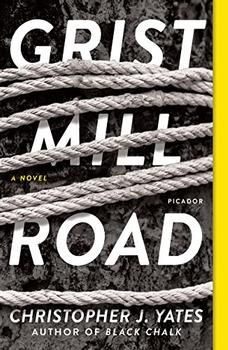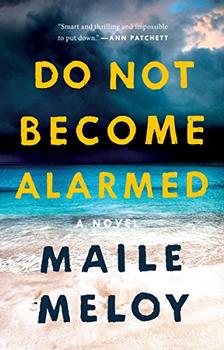Summary | Excerpt | Reading Guide | Reviews | Beyond the book | Read-Alikes | Genres & Themes | Author Bio

In her first novel for adults, Breaking Wild, Diane Les Becquets, author of three young adult novels, creates a contemporary story set against the wild and rugged background of northwestern Colorado with themes that include family relationships, the role of community, survival, addiction and coping with loss. Breaking Wild is an astonishing and complex portrait of two strong, independent women damaged by their pasts: Amy Raye Latour, a skilled hunter, wife and mother to two young children and law enforcement ranger Pru Hathaway, a single mom to her teenage son.
The story, which alternates between the two lead protagonists, opens in third person with Amy Raye, whose weapon of choice is the compound bow because her gentle and tolerant husband, not a fan of hunting, does not want guns in the house. We meet her on a camping and hunting trip with two male companions. Seeking the solitude and quiet she needs to bring down an elk with a bow, Amy Raye sprays herself with elk estrus—female elk urine taken during the breeding cycle and used by hunters to mask personal scent and attract a male elk—and then leaves camp alone in the still dark hours of early morning. When she doesn't return to camp that night, her companions call the local authorities.
The second point of view is in first person present. Pru Hathaway works for the Bureau of Land Management with the only certified SAR—search and rescue—dog in the county. When Amy Raye goes missing, Pru and her dog Kona are called in to look for her. Both women are familiar with being alone in the woods—they are used to feeling safe, confident, self-reliant and seeking solace in the solitude. But as a winter snowstorm moves in and a cougar is sighted in the area, the need to find Amy Raye takes on a sense of urgency. On top of that, Pru feels a connection to the missing woman and becomes emotionally invested in finding her. She says, "There was something about a search that was compelling and heady. The urgency, the meticulous use of the senses, and the desperate need to replace what was missing, to smooth out what had become so devastatingly out of sorts."
The alternating stories format is a very effective device for ratcheting up tension. Readers are witness to each party's missteps and wrong assumptions. (At times, I found myself speaking aloud—No! Not that way! Please turn around!) The author gives the two characters different time frames. Amy Raye's narrative is mostly lagging days behind Pru's, and this method works to create tension. For instance, we follow Amy Raye for chapters through her first twenty-four hours, sharing her irritation and then growing panic at being truly lost in the immense and increasingly inhospitable wilderness. While Pru continues to search past day one, we lose track of Amy Raye—on day four of the search, we don't know where she is. Like Pru's search and rescue dog Kona, readers are led to feel like they have the scent only to lose it.
Weather continues to be a ticking clock. As days pass and Amy Raye is still not found, questions of suicide, being killed by a cougar and even murder are brought into play. All along, the reader knows more than the search and rescue team, without knowing Amy Raye's ultimate fate until the very end.
These characters are complex, presented with all their shortcomings, regrets, disappointments, worries, sorrows and survival instincts. As the novel progresses, the backstory of both women is slowly revealed in flashbacks doled out in short tension-filled chapters. We learn that both Amy Raye and Pru are haunted by demons that interfere with their capacity for romantic love. Amy Raye carries the guilt and shame of addictive behavior that started when she was a teen growing up on her grandparent's farm; her emotional terrain is as rough and ragged as the pits and cliffs of the landscape she is lost in. Pru struggles with her deep love for her teenage son—watching him grow up, learning to let go, while still living with the pain of a loss that happened many years before.
Beyond the fascinating and compelling characters, the urgency of the search, the well crafted pacing and the stunning but terrifying backdrop of the wilderness, this story has been meticulously researched—all the details of the search and rescue operation, the kinds of equipment both the hunters and the SAR crew would use, and even the specifics of the vehicles, lend authenticity. For example, as Amy Raye prepares to wait for her prey in a tree stand she'd located the day before, we read:
She tied her bow to the thin nylon rope that hung from the stand, then climbed to the platform, stepping and pulling her way up by the metal pegs set into the trunk, careful not to catch her pack on branches. When she reached the top, she secured extra webbing around the trunk of the tree and hooked it into the carabiner on the back of her harness. She hung her pack on a peg, then hoisted her bow…The sky was still black, blotted by a plush layer of clouds. She felt a sense of invisibility in the tree, in the outline of its mass, as she waited for daylight, as a muscle across her shoulder relaxed and she thought of other places she had been, the tree stands and blinds she'd set over the years, the mornings like this one.
Throughout, I found myself fighting the urge to read fast to find out what happens while also wanting to slow down to absorb and appreciate the details of the search. Near the end, the pacing quickens even more, causing pages to fly as we hold our breath in anticipation of the final outcome. I recommend this novel to anyone who enjoys a well-plotted thriller with emotionally rich and complicated characters.
![]() This review
first ran in the February 17, 2016
issue of BookBrowse Recommends.
This review
first ran in the February 17, 2016
issue of BookBrowse Recommends.

If you liked Breaking Wild, try these:

by Christopher J. Yates
Published 2018
The highly anticipated new novel from the author whose debut was called "The smart summer thriller you've been waiting for...The novel you should be reading tonight" (NPR's All Things Considered) and was named a Book of the Year by NPR and an Entertainment Weekly Must-List Pick.

by Maile Meloy
Published 2018
From a beloved, award-winning writer, the much-anticipated novel about what happens when two families go on a tropical vacation - and the children go missing.
Your guide toexceptional books
BookBrowse seeks out and recommends the best in contemporary fiction and nonfiction—books that not only engage and entertain but also deepen our understanding of ourselves and the world around us.